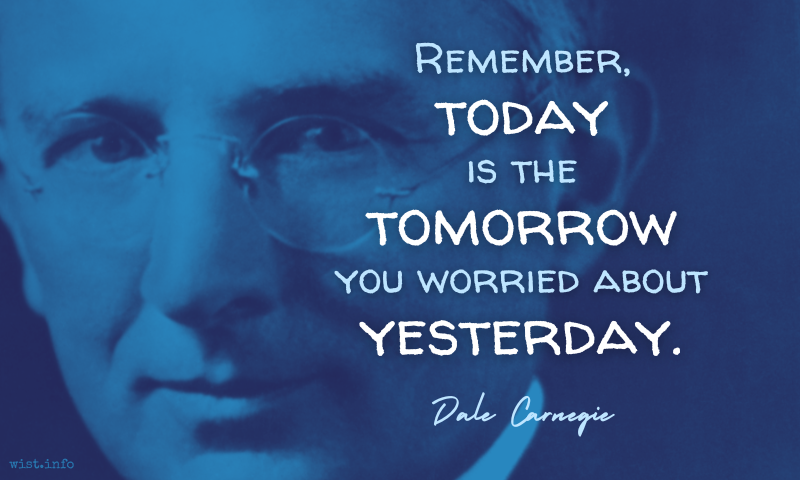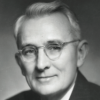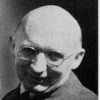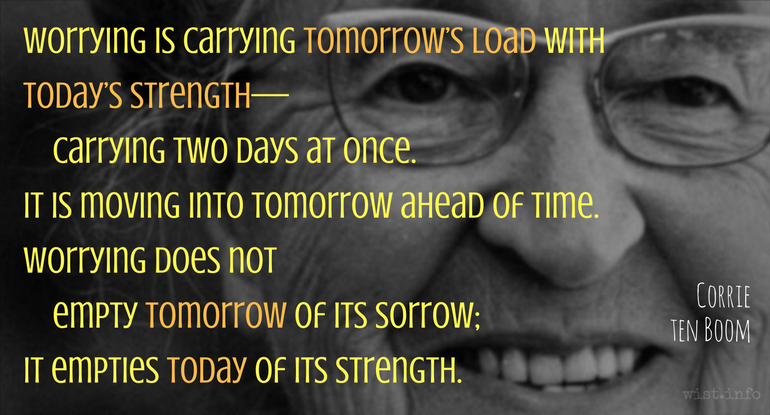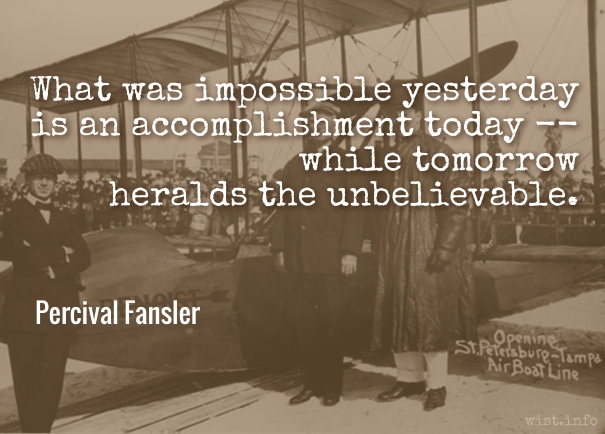Know the true value of time; snatch, seize, and enjoy every moment of it. No idleness, no laziness, no procrastination: never put off till to-morrow what you can do to-day.
Lord Chesterfield (1694-1773) English statesman, wit [Philip Dormer Stanhope]
Letter (1749-12-26) to his son (#211)
(Source)
Chesterfield either loves the "Never put off" phrase or is very familiar with it: he repeats it a few months later in Letter 216 (1750-02-05), and then a few years later in Letter 309 (1754-02-26).
See Fuller and Franklin.
Quotations about:
tomorrow
Note not all quotations have been tagged, so Search may find additional quotes on this topic.
Never leave that till tomorrow which you can do today.
Benjamin Franklin (1706-1790) American statesman, scientist, philosopher, aphorist
“The Way to Wealth” (1758)
(Source)
Today, this is more commonly given as "Never put off till tomorrow what you can do today."
Franklin had used a different phrasing in Poor Richard (1742 ed.): "Have you somewhat to do To-morrow, do it To-day." That was reprinted in Poor Richard Improved (1758 ed.), but when that latter work was condensed into "The Way to Wealth" that same year, the wording above was used.
As with so many of Franklin's "Poor Richard" aphorisms, this was not original to him. Thomas Fuller uses a similar phrase in 1725.
The sentiment itself has been mocked or modified by others such as Mark Twain, Josh Bilings, Aldous Huxley, Pablo Picasso, and Mignon McLaughlin.
O my brave men! stout hearts of mine!
who often have suffered worse calamities with me.
let us now drown your cares in wine.
Tomorrow we venture once again upon the boundless sea.[O fortes peioraque passi
mecum saepe viri, nunc vino pellite curas;
cras ingens iterabimus aequor.]Horace (65-8 BC) Roman poet and satirist [Quintus Horacius Flaccus]
Odes [Carmina], Book 1, # 7, l. 30ff (1.7.30-32) (23 BC) [tr. Alexander (1999)]
(Source)
To L. Munatius Plancus. Quoting Teucer to his crew on his being exiled from Salamis.
Quoted in Montaigne, 3.13 "On Experience" (immediately following this).
(Source (Latin)). Alternate translations:Brave Spirits, who with me have suffer'd sorrow,
Drink cares away; wee'l set up sails to-morrow.
[tr. "Sir T. H.," Brome (1666)]Cheer, rouze your force,
For We have often suffer'd worse:
Drink briskly round, dispell all cloudy sorrow,
Drink round, Wee'l plow the Deep to-morrow.
[tr. Creech (1684)]Hearts, that have borne with me
Worse buffets! drown today in wine your care;
To-morrow we recross the wide, wide sea!
[tr. Conington (1872)]O gallant heroes, and often my fellow-sufferers in greater hardships than these, now drive away your cares with wine: to-morrow we will re-visit the vast ocean.
[tr. Smart/Buckley (1853)]Now, ye brave hearts, that have weather'd
Many a sorer strait with me,
Chase your cares with wine, — to-morrow
We shall plough the mighty sea!
[tr. Martin (1864)]Brave friends who have borne with me often
Worse things as men, let the wine chase to-day every care from the bosom,
To-morrow -- again the great Sea Plains.
[tr. Bulwer-Lytton (1870)]My comrades bold, to worse than this
Inured, to-morrow brave the vasty brine,
But drown to-day your cares in wine.
[tr. Gladstone (1894)]O brave friends, who have oft with your leader
Suffer'd worse trials, cheer up, let sorrows dissolve in the wine-cup,
We will try the vast ocean to-morrow.
[tr. Phelps (1897)]O brave men, often worse things ye with me
Have borne, now drive with wine your cares away,
To-morrow we will sail the wide sea once again.
[tr. Garnsey (1907)]To-night with wine drown care,
Friends oft who've braved worse things with me than these;
At morn o'er the wide sea once more we'll fare!
[tr. Marshall (1908)]O ye brave heroes, who with me have often suffered worse misfiprtunes, now banish care with wine! To-morrow we will take again our course over the mighty main.
[tr. Bennett (Loeb) (1912)]With wine now banish care;
Worse things we've known, brave hearts; once more
we'll plough the main tomorrow morn.
[tr. Mills (1924)]You who have stayed by me through worse disasters,
Heroes, come, drink deep, let wine extinguish our sorrows.
We take the huge sea on again tomorrow.
[tr. Michie (1964)]O my brave fellows who have gone through worse
Than this with me, now with the help of wine
Let's put aside our troubles for a while.
Tomorrow we set out on the vast ocean.
[tr. Ferry (1997)]O you brave heroes, you
who suffered worse with me often, drown your cares with wine:
tomorrow we’ll sail the wide seas again.
[tr. Kline (2015)]
Put not oph till to-morrow what can be enjoyed to-day.
[Put not off till tomorrow what can be enjoyed today.]
Josh Billings (1818-1885) American humorist, aphorist [pseud. of Henry Wheeler Shaw]
Everybody’s Friend, Or; Josh Billing’s Encyclopedia and Proverbial Philosophy of Wit and Humor, ch. 148 “Affurisms: Ink Brats” (1874)
(Source)
ORSINA: Better counsel comes overnight.
[Besserer Rat kommt über Nacht.]Gotthold Lessing (1729-1781) German playwright, philosopher, dramaturg, writer
Emilia Galotti, Act 4, sc. 3 (1772)
It is unclear if this is a traditional German saying, or was coined by Lessing. There are parallels in other languages (as well as German), but I did not find a German reference in these words that predates this play.
(Source (German))Better counsel comes with the night.
[Source (1842)]Morning brings better counsel.
[tr. Lewes/Taylor (1890)]Better counsel often comes by night.
[tr. Gode-von Aesch (1959?)]
Go, sit in the shade of the rose, for every rose
That springs from the earth, again to earth soon goes away!Omar Khayyám (1048-1123) Persian poet, mathematician, philosopher, astronomer [عمر خیام]
Rubáiyát [رباعیات], Bod. # 135, ll. 3-4 [tr. M. K. (1888)]
(Source)
Alternate translations:And look -- a thousand Blossoms with the Day
Woke -- and a thousand scatter'd into Clay
[tr. FitzGerald, 1st ed. (1859), # 8]Morning a thousand Roses brings, you say;
Yes, but where leaves the Rose of yesterday?
[tr. FitzGerald, 2nd Ed (1868), # 9]Each Morn a thousand Roses brings, you say:
Yes, but where leaves the Rose of Yesterday?
[tr. FitzGerald, 3rd ed. (1872), # 9; same in later editions]Sit in the shade of the rose, for many times this rose from earth has come, and unto earth has gone.
[tr. McCarthy (1879), # 463]Sit we beneath this rose, which many a time
Has sunk to earth, and sprung from earth again.
[tr. Whinfield (1883), # 414]Sit in the shade of the rose, for, by the wind, many roses
have been scattered to earth and have become dust.
[tr. Heron-Allen (1898), # 135]Sit we 'neath this rose shade, for many a rose
Wind strewn in earth has turned to earth again!
[tr. Thompson (1906), # 522]Sit in her fragrant bower, for oft the wind
Hath strewn and turn'd to dust such flowers as these.
[tr. Talbot (1908), # 135]Rest in the shadow of the rose, for many of its leaves will the rose
Shed on the earth while we lie under the earth.
[tr. Rosen (1928), # 270]Stay, Dearest One! beneath the rosy shade,
The roses bloom for Thee but soon would blight.
[tr. Tirtha (1941), # 3.7]Sit in the rose's shadow, for oftentimes this rose shall spill upon the dust, when we are dust.
[tr. Bowen (1976), # 5a]The Rosetree spills her petals in the dust,
And nothing of her fragrant harvest saves;
And yet this Rose, a plaything of the breeze,
Will bloom each year when we are in our graves.
[tr. Bowen (1976), # 5b]
Remember, today is the tomorrow you worried about yesterday.
Dale Carnegie (1888-1955) American writer, lecturer
How to Stop Worrying and Start Living, Part 10 “How I Conquered Worry” (1948)
(Source)
Final note by Carnegie on the story "Six Major troubles Hit Me All At Once" by C. I. Blackwood of Oklahoma City.
The phrase was a "rule" Carnegie taught in his adult courses, and he collected many reports from students about how the various rules taught in the course actually worked in their lives. Thus the "remember" above and how the phrase is also mentioned, quoted in the past tense, in the story "I Now Look for the Green Light," by Joseph M. Cotter of Chicago: "I was told over and over that 'today was the tomorrow I had worried about yesterday.'"
KENT: Fortune, good-night. Smile once more; turn thy wheel.
William Shakespeare (1564-1616) English dramatist and poet
King Lear, Act 2, sc. 2, l. 188 (2.2.188) (1606)
(Source)
Write it on your heart that every day is the best day in the year. He is rich who owns the day, and no one owns the day who allows it to be invaded with fret and anxiety. Finish every day and be done with it. You have done what you could. Some blunders and absurdities, no doubt crept in. Forget them as soon as you can, tomorrow is a new day; begin it well and serenely, with too high a spirit to be cumbered with your old nonsense. This new day is too dear, with its hopes and invitations, to waste a moment on the yesterdays.
Ralph Waldo Emerson (1803-1882) American essayist, lecturer, poet
(Spurious)
This widely spread inspirational quotation is actually a piecing-together of multiple phrases from different sources, some not even Emerson. It includes bits from his essay "Works and Days" (here and here), observations on Emerson by Lillian Whiting, and fragments from a letter by him to his daughter Ellen.
The result sounds much like Emerson, but would require more ellipses than text to qualify as a quotation of him. It would be a great candidate for an AI "quotation" except that references to it can be found back in the 2010s, so it is almost certainly of human origin.
More detailed discussion: poetry - From which book or essay are these words by Ralph Waldo Emerson? "Write it on your heart that every day is the best day in the year..." - Literature Stack Exchange.
Never put off till tomorrow what you can do day after tomorrow just as well.
Mark Twain (1835-1910) American writer [pseud. of Samuel Clemens]
“Memoranda: The Late Benjamin Franklin,” epigraph, The Galaxy Magazine (Jul 1870)
(Source)
Offered as a faux Franklin maxim, in an essay where Twain mocked veneration of Franklin's biography and supposedly original aphorisms.
More background on this quotation: Never Put Off Till Tomorrow What You Can Do The Day After Tomorrow Just As Well – Quote Investigator.
You’ll “start living tomorrow”? Start living today already, Postumus, you’re running out of time. Anyone with sense started living yesterday.
[Cras vives? hodie iam vivere, Postume, serum est:
Ille sapit, quisquis, Postume, vixit heri.]Martial (AD c.39-c.103) Spanish Roman poet, satirist, epigrammatist [Marcus Valerius Martialis]
Epigrams [Epigrammata], Book 5, epigram 58 (5.58.7-8) (AD 90) [tr. Nisbet (2015)]
(Source)
(Source (Latin)). See a related sentiment by Martial in 1.15. Alternate translations:Thou'lt live to morrow? -- 'tis too late to day:
Hee's wise who yesterday, I liv'd, can say.
[tr. Sherburne (1651)]Thou'lt live tomorrow? -- this day's life's too late:
He's wise that lived before the present date.
[tr. Fletcher (1656)]Tomorrow will I live, the fool does say;
Today itself's too late; the wise lived yesterday.
[tr. Cowley (1668), in Hay, "Appendix," ep. 59]Today to live, ev'n that's too late I say.
The wiseman, Posthumus, liv'd Yesterday.
[tr. Oldmixon (1728)]You will live, you say, tomorrow; it is late, Posthumus, to live today; he is wise who lived yesterday.
[tr. Amos (1858), ch. 3, ep. 46, noted as Martial Book 5, ep. 59]You will live tomorrow: even today it is too late to begin to live. He is the wise man, Postumus, who lived yesterday.
[tr. Bohn's Classical (1859)]To live today, Postumus, is already too late. He is wise, whoever he be, Postumus, who "lived" yesterday.
[tr. Ker (1919)]"Tomorrow": -- nay, do not this moment delay.
The wise man is he who has lived yesterday.
[tr. Pott & Wright (1921)]You'll live tomorrow? Now's too late, I say.
He's wise, my Postumus, who lived yesterday.
[tr. Francis & Tatum (1924), #255]Yes, this is what wise Martial says,
Though in another way:
"It's much too late today to live!
The wise lived yesterday!"
[tr. Marcellino (1968), "To a Crass Procrastinator"]"Tomorrow"? -- Postumus, today's too late.
The wise man, Postumus, lived yesterday.
[tr. Whigham (1987)]Will you live tomorrow? It's already overlate, Postumus, to live today. He is wise, Postumus, who lived yesterday.
[tr. Shackleton Bailey (1993)]Tomorrow? It’s already too late to live today:
He who lived yesterday, Postumus, he is wise.
[tr. Kline (2006)]Forget tomorrow's teasing long delay.
To make life pleasant, dwell on yesterday.
[tr. Wills (2007)]Will you live then? Today is late already.
He's wise who did his living yesterday.
[tr. McLean (2014)]Believe me, wise men don’t say “I shall live to do that,”
Tomorrow’s life is too late; live today.
Work is the greatest thing in the world — so we should save some of it for to-morrow.
‘Tis not, believe me, a wise man’s part to say, “I will live.” Tomorrow’s life is too late: live today.
[Non est, crede mihi, sapientis dicere “Vivam”:
Sera nimis vita est crastina: vive hodie.]Martial (AD c.39-c.103) Spanish Roman poet, satirist, epigrammatist [Marcus Valerius Martialis]
Epigrams [Epigrammata], Book 1, epigram 15 (1.15.11-12) (AD 85-86) [tr. Bohn’s (1859)]
(Source)
A sentiment echoed in 5.58. (Source (Latin)). Alternate translations:Trust me, it is not wise to say,
I'll live; 'twill be too late tomorrow,
Live if thou'rt wise today.
[tr. Oldmixon (1728)]"I'll live tomorrow," will a wise man say?
Tomorrow is too late, then live today.
[tr. Hay (1755), quoted in Bohn's, but not in Hay's own book]Tomorrow I shall live, the fool will say. [...]
Wouldst thou be sure of living? Live today.
[tr. Elphinston (1782), Book 2, ep. 45]No wisdom 'tis to say "I'll soon begin to live."
'Tis late to live tomorrow; live today.
[ed. Harbottle (1897)]It sorts not, believe me, with wisdom to say "I shall live."
Too late is tomorrow's life; live thou today.
[tr. Ker (1919)]"I'll live tomorrow," no wise man will say;
Tomorrow is too late. Then live today.
[tr. Francis & Tatum (1924), #10]To say, "I mean to live," is folly's place:
Tomorrow's life comes late; live, then, today.
[tr. Duff (1929)]It's not a wise man's part to say
"I'll live," Tomorrow's life is much to late.
Live! Today.
[tr. Bovie (1970)]Believe me, the wise man does not say "1 shall live." Tomorrow's life is too late. Live today.
[tr. Shackleton Bailey (1993)]No sage will e'er "I'll live tomorrow" say:
Tomorrow is too late: live thou today.
[tr. WSB]
Worrying is carrying tomorrow’s load with today’s strength — carrying two days at once. It is moving into tomorrow ahead of time. Worrying does not empty tomorrow of its sorrow; it empties today of its strength.
Do you remember the ’60s and ’70s? You didn’t have to go more than a week before there was an article in Life magazine — “The Home of Tomorrow,” “The City of Tomorrow,” “Transportation of Tomorrow.” All that ended. In the 1970s, after we stopped going to the Moon, it all ended. We stopped dreaming. And so I worry that decisions that Congress makes doesn’t factor in the consequences of those decisions on tomorrow. Tomorrow’s gone. They’re playing for the quarterly report, they’re playing for the next election cycle, and that is mortgaging the actual future of this nation, and the rest of the world is going to pass us by.
Neil deGrasse Tyson (b. 1958) American astrophysicist, author, orator
Real Time with Bill Maher, Ep. 223 (5 Aug 2011)
(Source)
MARIAN: No, please, not tonight. Maybe tomorrow.
HAROLD: Oh, my dear little librarian. You pile up enough tomorrows, and you’ll find you are left with nothing but a lot of empty yesterdays.
It isn’t good to hold on too hard to the past. You can’t spend your whole life looking back. Not even when you can’t see what lies ahead. All you can do is keep on keeping on, and try to believe that tomorrow will be what it should be — even if it isn’t what you expected.
To-morrow to fresh Woods, and Pastures new.
MACBETH: To-morrow, and to-morrow, and to-morrow,
Creeps in this petty pace from day to day
To the last syllable of recorded time,
And all our yesterdays have lighted fools
The way to dusty death. Out, out, brief candle!
Life’s but a walking shadow, a poor player
That struts and frets his hour upon the stage
And then is heard no more: it is a tale
Told by an idiot, full of sound and fury,
Signifying nothing.William Shakespeare (1564-1616) English dramatist and poet
Macbeth, Act 5, sc. 5, l. 22ff (5.5.22-31) (1606)
(Source)
God has promised forgiveness to your repentance, but He has not promised tomorrow to your procrastination.
Augustine of Hippo (354-430) Christian church father, philosopher, saint [b. Aurelius Augustinus]
(Paraphrase)
This appears to be a heavy paraphrase from Sermon 40.5-6 [tr. Edmund Hill]:"I'm only asking," he says, "to be allowed a little more time." Why? "Because God has promised me pardon." But no one has promised you that you are going to be alive tomorrow. Or else, just as you have read in the prophet, the gospel, the apostle, that when you have turned back to him God will blot out all your iniquities, read out to me where a tomorrow is promised you, and then live in an evil way tomorrow.
For more discussion, see:









